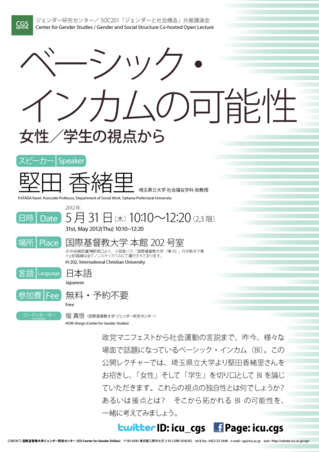Kaori KATADA
Assistant Professor, Saitama Prefectural University
【The article below is the same as the article that appears in the fifteenth issue of the CGS Newsletter.】
In this issue, we explore new ways of looking at the nature of labor and society, and how they affect our lives. Working under the title, "To Work is to Live: Gender Perspectives," our first topic is "Basic Income." We asked Kaori Katada, co- editor of the book Bēshikku inkamu to jendā [Basic Income and Gender] (Gendai shokan, 2011), about how she thinks this concept opens up new horizons for society.
Basic income (hereafter BI) is a simple concept of public policy, which unconditionally guarantees that all individuals will have an income to meet their essential human needs. In other words, it funds, directly and entirely unconditionally, the basic necessities of life. The responsibility for many of the fundamentals of our existence--childbirth and childrearing, caring for the elderly, cooking meals, and doing other housework--have usually been shouldered by women. Women have, for so long, taken on all kinds of unpaid labor in this way; hence, it follows that BI should, first and foremost, be envisaged and designed by women.
Social exclusion in relation to the working poor, the homeless, and impoverished single-mother households has increasingly been problematized since the 1990s. The existing income-security system of the welfare state has been unable to cope with these problems of social exclusion and poverty. BI has attracted attention as a new public policy scheme that supports diversity and promotes social inclusion. It differs in two significant ways from the current system.
First, BI is based on individual units. The welfare state mainly provides income security in household units because it is based on the premise of the modern family, which is modeled on stereotyped gender roles of men working outside the home (paid labor) and women working within the home (unpaid labor). Conversely, as a payment to individuals, BI could help to mitigate unequal distribution within households and is also open to new family patterns. Second, BI is unconditional. Unlike the welfare-state system, individuals can apply for BI to meet their basic human needs, irrespective of labor, assets, sex, age, or marital status. This eliminates the need for means tests, thereby avoiding the stigma associated with such tests.
The biggest concern regarding BI to date is that the scheme could lead people to stop working. However, this is based on an underlying assumption that we human beings only work to earn money, which is a rude and presumptuous delusion that is far removed from the realities of our society. Why, for example, over the centuries, have women borne and raised children without being paid a cent, or created works of art (paintings, poetry, etc.) even though they could not earn a living from it? The activities of childrearing, housework, and artistic creation may be unpaid, but they are still forms of labor. In fact, what should rather be called into question is the unpaid labor of women on which so many people have continued to enjoy a free ride.
Thus, BI can be a lens through which we re-examine the nature of labor, the family, social security, and, by extension, life itself. I hope we can all share our desires and knowledge to consider the potentials of BI in pioneering a new society and a new quality of life.
